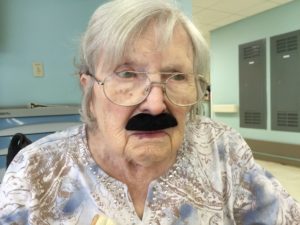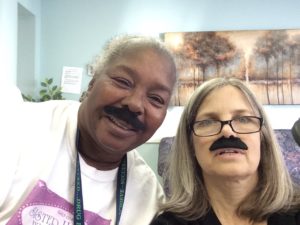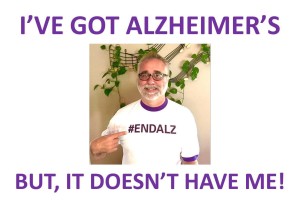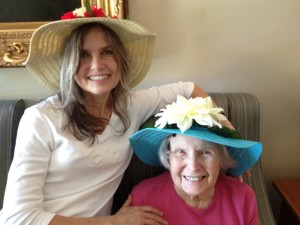The Mustache Test
Life in a nursing home can become mundane after many hours of sitting still, day in and day out, while parked in a wheelchair in front of or within earshot of television after the basics of dressing and eating are accomplished, often empty-handed, left to one’s imagination.
As I joined my mother on a daily basis to help pass the long afternoons, we often found ourselves in the dayroom of the wing where her room was located, along with other residents who were also passing the time. Although I was a family member – a visitor – I was such a regular presence, that I felt as if I lived there, too. After all, I was subject to the ebb and flow of activity, while attempting to accommodate where my mother should be in order to receive the care she was scheduled for. If I took her away from her area at the wrong time, she might miss being checked for wet pants or something important like that, so we often stayed around and visited with whoever might be present. Usually, our neighbors from the hall were also in limbo until something might come along to create a diversion – like the ice cream cart or an arrival of a new resident that we were all alerted to over the loudspeaker by the announcement, “Let us all welcome the new admit to, say, the East Wing, let us all welcome the new admit to the East Wing.” This revelation was always met among the residents with head shaking and looking at each other incredulously as we all wondered about the new admit. Once again we were reminded that we were viewed as “admits” without a name. Not people or neighbors, or friends but “admits.” I’m sure there was some privacy policy being followed here but eventually, we would get to know the person’s name. Why not just go ahead and say it. Just once. But it was never to be.
It didn’t take long to realize that the initial loss of identity would remain. However visible you really were didn’t hinder how routinely you were overlooked. Even though this day room was within sight of the nurse’s station and was adjacent to the hall with staff going to and from, we rarely received eye contact from any of the passerby’s.
So, one day, I decided to test my theory that we existed in what has been referred to as “the land of the living dead”. I viewed my self-imposed status of nursing home resident with Alzheimer’s disease much like joining a leper colony. We had our own community, removed and distinct from where we once lived. We had suffered the grief of our loss of recognition and position in society, but in this safe harbor, where the promise of care and understanding by the marketer on our original tour of the nursing home was assured, would we have to endure being invisible here as well?
William James’ said, “No more fiendish punishment could be devised, were such a thing physically possible, than that one should be turned loose in society and remain absolutely unnoticed by all of the members thereof.”
We were all in a back hall being given the basics of care but were we seen? Did anyone really care who we were or what we wanted or needed?
I had in my big bag of goodies a package of stick-on mustaches. I often brought in an assortment of potential activities in case the time was right for a game of cards, magazines, watercolors, brushes, a pad of paper and a blue-tooth speaker to connect with my smartphone for endless choices of music that we would use for our own entertainment and for anyone else who might be interested. So on this particular day, I decided to see if anyone would notice if everyone in the dayroom was wearing a mustache. I was tired of feeling overlooked and rejected and I just wanted to see what would happen. After getting permission from my fellow conspirators, we each picked out the preferred style of mustache and stuck them under our noses – and waited. We giggled and amused ourselves with how we looked and I snapped photos (another breach of privacy but since no one was looking…) Yet, as the staff went to and fro, no one looked in to see us.
After a while, we grew tired of our little joke. The excitement waned as we realized no one was taking the bait. Seeing that one mustache had become something to chew on like a piece of candy, I retrieved them. Our experience supported my theory, confirming that we did exist in our own little world, unnoticed and ignored. As much as we were making the most of our interactions among ourselves, society around us was so busy and focused, that they missed out on our mischief that day and so many more. “Fiendish punishment,” indeed. The regular feeling of isolation and rejection wears on a person, slowly dimming the light of hope and expectations until the lights finally go out.
I recently heard a speaker tell about “the 90-second rule.” Where staff in a residential care facility were required to spend 90 seconds with every resident they encountered, speaking positively and warmly before they went on with their duties. I needed that kind of encouragement as a family member who was responsible for the welfare of my mother whom I had given over to their care. Not only did I want my mother to feel included, recognized, and valued, but as a caregiver, I needed validation and acceptance as well.
To be fair, I always tried to empathize with the staff, especially the CNA’s. They were the least educated, the least paid, yet held the most influential position for setting the mood and quality of life for each resident. No one was more intimately involved with the residents. They did the dressing, bathing, providing all acts of hygiene, feeding, and helping. It was no wonder that they didn’t want to look over at a resident they had already tended to. Maybe they wanted to avoid the endless requests for something or general confusion about what was happening and “where am I” and “when am I going home” questions. Yet, I was keenly aware of their understanding or lack thereof of how to interact with someone with dementia. Correcting, disregarding, and speaking about them as if they couldn’t hear was upsetting to watch and I often hoped that by demonstration, things would change. Perhaps they would see that I could brush my mother’s teeth without any resistance from her and thoroughly clean out her mouth of all lingering food. Didn’t they realize that it took some time and effort to warm up to my mother rather than expect her to perform on command? Maybe they would see the positive reaction to music instead of promoting the noise from the afternoon programs on television that may have been perceived as reality. I often wrestled at night, trying to come up with a new approach that might build a bridge to improved communications and care for my mother. Several times I brought in baked goods, provided meals of pizza and fixings for two shifts of care, shared citrus fruit from my tree to show my appreciation and for a time, kept a supply of granola bars and candy in my mother’s side table drawer as a treat for the CNA’s unsung efforts. There were some very nice exceptions that I always hoped would appear at the beginning of the next shift, but the steady stream of staff changes made each day unpredictable.
Despite my efforts, sometimes I was treated as a bother, in the way, or just not visible. Just like the residents, I often hungered for someone to smile at me and treat me like they were happy to see me. So my closest allies became the other residents, those who were lining the halls as I passed to enter and exit the long pathway to my mother’s room. In time, I found ways to connect to residents and staff that would make my life better. But what about the residents? Would life improve for them, too?
The mustache test validated what I already knew. It is possible to be alone in a crowded place. The greatest punishment is to go unnoticed by society yet with a little intentional effort that can be changed. You don’t have to have all the solutions to someone’s trials to make a difference. Sometimes all it takes is a smile, a kind heart, and a listening ear.
My time with our neighbors in skilled care over that 4 year period were some of the richest personal interactions I’ve ever experienced. My hope and purpose in writing this are that in all circumstances, especially for the many who are living with Alzheimer’s disease, we take the time to see one another for who we have been and who we really are now, enjoy one another through those encounters, and embrace the present as the gift it is.












Recent Comments